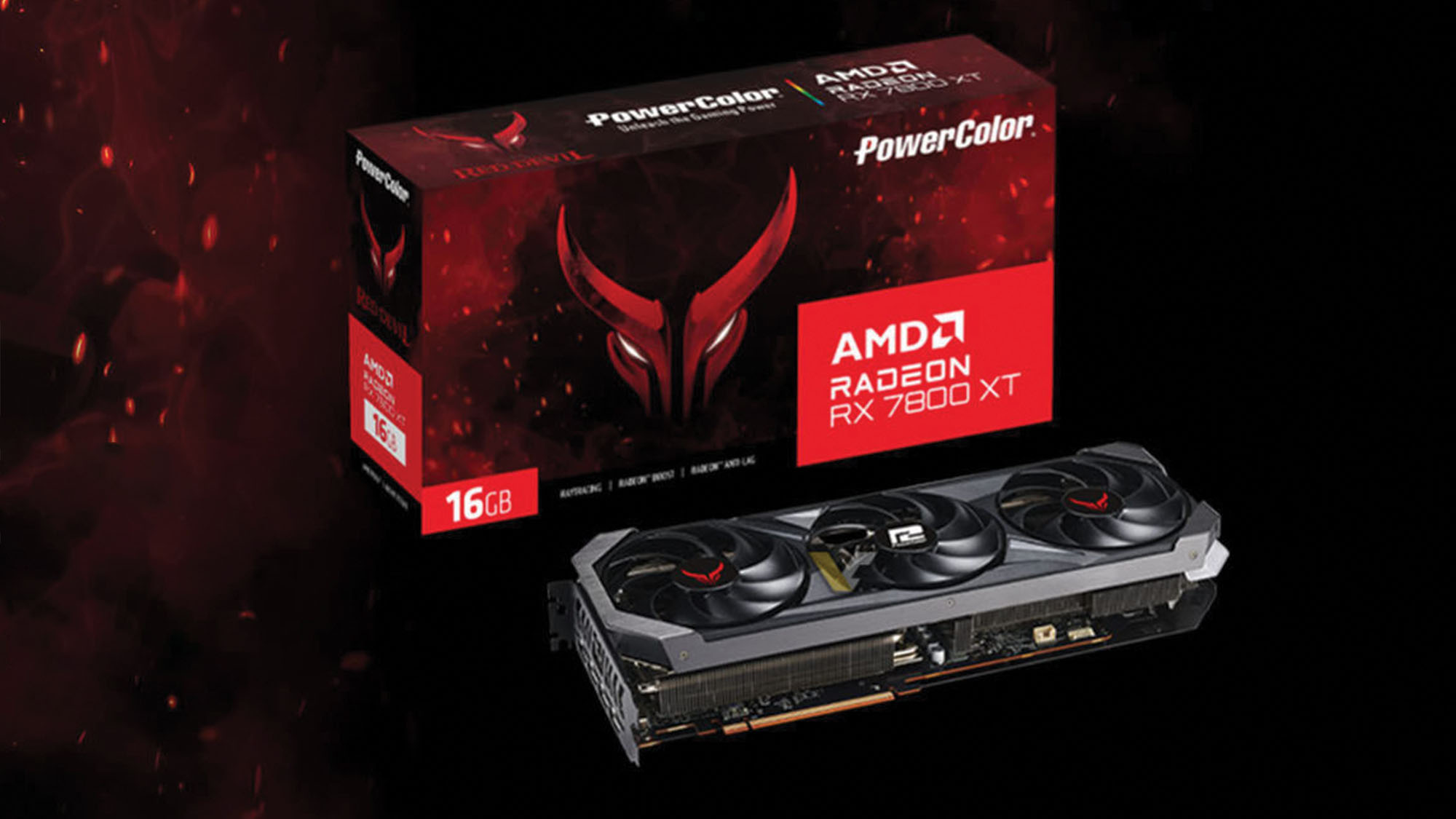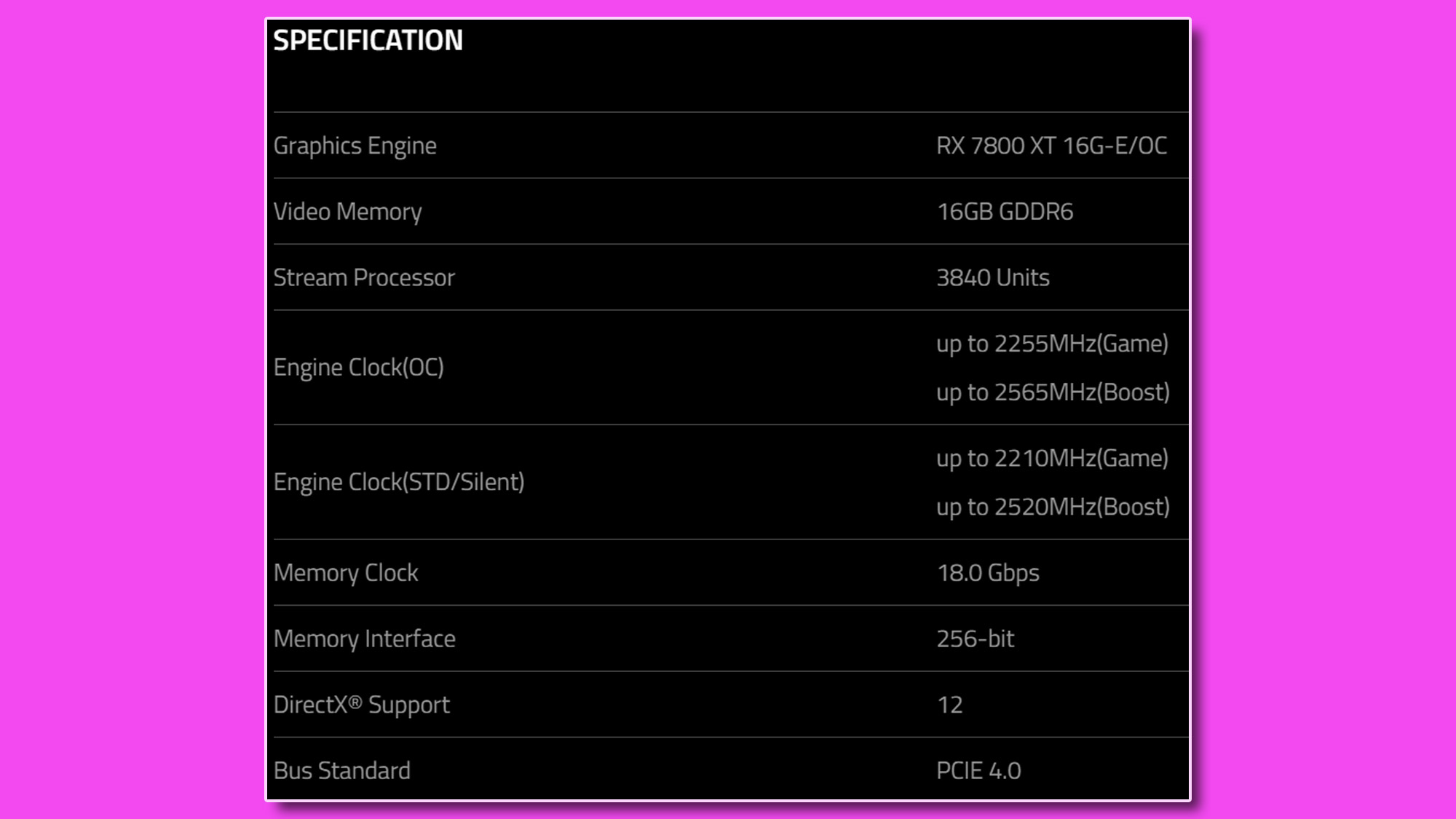PowerColor blows it and reveals the AMD Radeon RX 7800 XT weeks before its announcement
Whoopsie Devil...

Sign up for breaking news, reviews, opinion, top tech deals, and more.
You are now subscribed
Your newsletter sign-up was successful
The AMD Radeon RX 7800 XT has been accidentally revealed by PowerColor after the product page for the card appeared on PowerColor's website.
PowerColor, an AMD board partner (for now, anyway), accidentally posted the product page for the AMD graphics card, which we've been anticipating would launch this quarter. AMD hasn't actually announced the card yet, so the product page slip-up — first spotted by Twitter leaker All The Watts! and confirmed by Videocardz — essentially steps on AMD's eventual reveal.
Not only do we get a look at PowerColor's version of the card, but the product page also reveals the actual specs of the card.
Needless to say, the product page was quickly taken down by PowerColor, but the damage, as much as it is, is already done. It is just one card though, and it's possible that AMD has other cards coming along with the RX 7800 XT, namely the AMD RX 7700 XT, so whenever AMD makes its announcement, it might not be entirely spoiled for Team Red.
The fact that the AMD Radeon RX 7800 XT is inbound really isn't a surprise to anyone. While the launch of the AMD Radeon RX 7600 ahead of the rest of AMD's enthusiast and midrange stack looks to have been a smart move on AMD's part, the RX 7800s and RX 7700s (XTX / XT / Non-XT / Who knows?) is where a lot of the excitement lies.
This is especially true for the midrange gamer and enthusiast set who've only had the RX 7900 XTX and RX 7900 XT pine for, and these are both premium graphics cards that have likely been out of a lot of people's price ranges. With Nvidia launching pretty much its entire product stack for this generation already, AMD's RX 7800- and RX 7700-series cards are the final major releases that we're anticipating for at least another year, if not longer.
What do the specs tell us?

| Header Cell - Column 0 | RX 6800 XT | RX 7800 XT |
|---|---|---|
| Process Node | TSMC 7nm | TSMC 6nm |
| GPU | Navi 21 | Navi 32 |
| VRAM | 16GB GDDR6 | 16GB GDDR6 |
| Stream Processors | 4,608 | 3,840 |
| Game Clock (Default) | 2,015MHz | 2,210MHz |
| Game Clock (OC) | N/A | 2,255MHz |
| Boost Clock (Default) | 2,250MHz | 2,520MHz |
| Boost Clock (OC) | N/A | 2,565MHz |
| Memory Clock | 16.0 Gbps | 18.0 Gbps |
| Memory Bandwidth | 512.0 GB/s | 576.0 GB/s |
| Memory Interface | 256-bit | 256-bit |
| Bus Standard | PCIe 4.0 | PCIe 4.0 |
There are a few things that stand out from the leaked specs.
Sign up for breaking news, reviews, opinion, top tech deals, and more.
First, there are slightly higher Game and Boost Clocks, which makes sense since the Navi 32 GPU die is being fabbed on TSMC's 6nm process node, compared to the RX 6800 XT, which was fabricated on TSMC's 7nm node.
There is faster memory, even if it's the same VRAM pool and bus size, which should definitely help the card tear through 4K gaming. There are also only 60 CUs on the RX 7800 XT, compared to 72 for the RX 6800 XT, which translates into 3,840 and 4,608 stream processors, respectively.
Even though the RX 7800 XT will have fewer processing units, these are faster and more mature, so what AMD loses in quantity, it can hopefully make up in quality. The card will also feature two i8-pin power connectors, similar to the RX 7900 XTX and RX 7900 XT, so the TGP won't be higher than about 350W, though it's likely to be lower than 300W in the end.
The actual dimensions of the card will obviously vary between third-party manufacturers, and it's not known yet if AMD will be making its own reference card, but given the positioning of this card and the RX 7700 XT in the market, it's likely that we'll see AMD producing its own hardware as well.
While it's too soon to tell if this card will find its way into gamers' hearts (and our best graphics card page) , it looks like we won't have to wait too long .

John (He/Him) is the Components Editor here at TechRadar and he is also a programmer, gamer, activist, and Brooklyn College alum currently living in Brooklyn, NY.
Named by the CTA as a CES 2020 Media Trailblazer for his science and technology reporting, John specializes in all areas of computer science, including industry news, hardware reviews, PC gaming, as well as general science writing and the social impact of the tech industry.
You can find him online on Bluesky @johnloeffler.bsky.social